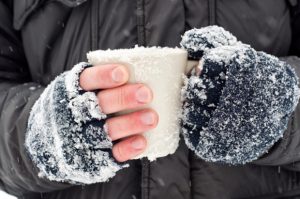 There are many wintertime dangers older adults are prone to, and frostbite is one of them. Also known as cold burn, frostbite is a medical condition in which a part of the body actually freezes. Mild frostbite rarely leaves permanent damage, but severe frostbite does. In extreme cases, frostbite may actually lead to amputation of the affected body part. Smokers, diabetics, and individuals with circulatory problems are at a higher risk of developing frostbite. Serious frostbite can occur within 30 minutes of being exposed to freezing temperatures.
There are many wintertime dangers older adults are prone to, and frostbite is one of them. Also known as cold burn, frostbite is a medical condition in which a part of the body actually freezes. Mild frostbite rarely leaves permanent damage, but severe frostbite does. In extreme cases, frostbite may actually lead to amputation of the affected body part. Smokers, diabetics, and individuals with circulatory problems are at a higher risk of developing frostbite. Serious frostbite can occur within 30 minutes of being exposed to freezing temperatures.
Older adults are more susceptible to frostbite because they generally have a lower body temperature, along with other medical conditions that can increase their frostbite risk.
Advertisement
It’s important to stay safe when heading outdoors in the winter and be aware of the early signs of frostbite as well as ways of preventing cold burns.
What frostbite feels like? Frostbite do’s and dont’s
Signs and symptoms of frostbite include slight pain, prickling or itching sensation of the skin, red, white, pale, or gray-yellowish skin color, hard or waxy looking skin, a cold or burning feeling, numbness, clumsiness due to joint or muscle stiffness, and blistering in severe cases.
Here’s what you can do to avoid frostbite:
- Limit time outdoors in cold, windy weather
- Dress in layers
- Wear a hat or headband that covers the ears
- Wear mittens
- Wear socks and sock liners that can keep your feet warm, insulated, and dry
- Don’t drink alcohol prior to heading outdoors
- Keep moving
How to treat frostbite
There are several treatment options for frostbite depending on the severity of your cold burn:
- Check for hypothermia
- Protect the skin from further exposure
- Get away from the cold
- Gently rewarm frostbitten area
- Take pain medication
- Don’t walk on frostbitten toes or feet – this will lead to further damage
- Remove damaged tissue – this is done by a medical professional
- Take infection-fighting drugs
- Take drugs that restore blood flow and prevent blood clots
Advertisement
Surgery is also an option in cases of severe frostbite.
If you know any seniors, make sure they are staying indoors and are keeping warm – especially if they have a disability.
Frostbite can be life-threatening, so it’s important to exercise caution whenever you step outside for a long period of time.
Related: Hypothermia and frostbite are winter health risks for seniors
